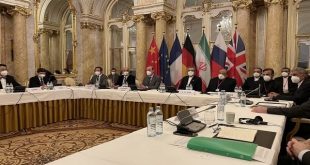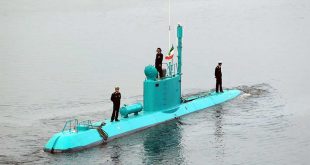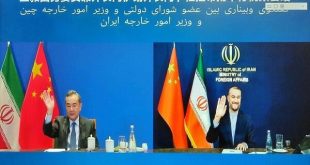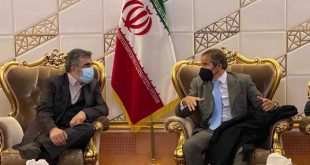TEHRAN (FNA)- Several leaders of different world states as well as the political and resistance officials in separate messages to Seyed Ebrahim Rayeesi congratulated him and the Iranian nation on his election as the president.
Iranian Interior Minister Abdolreza Rahmani Fazli announced on Saturday afternoon that Rayeesi has been elected as the new president of the country with 17,926,345 votes cast in his favor.
“Of the total number of eligible voters, which was 59,310,307, the total number of votes cast was 28,933,004, which shows a turnout of 48.8%,” Rahmani Fazli told reporters.
“Mr. Seyed Ebrahim Rayeesi, with 17, 926, 345 votes, stood first and was elected as the president,” he added.
Rahmani Fazli said that Mohsen Rezayee Mir Qa’ed gained 3,412,712 votes, Abdolnasser Hemmati received 2,427,201 votes and Seyed Amir Hossein Qazizadeh Hashemi earned 999,718 votes and the rest of the votes are considered invalid which includes 3,726,870 votes.
Iranians began voting in the early hours of Friday in a contest among 4 candidates in the 13th presidential elections and also for the 6th Islamic city and village council elections across the country.
State television showed people’s presence at polling stations in several cities and towns, quoting officials that over 59 million Iranians out of the more than 85 million population are eligible to vote.
Polls closed in Iran’s 2021 presidential election after 19 hours of voting nationwide and in various foreign countries.
Shortly after the early results, Leader of the Islamic Revolution Ayatollah Seyed Ali Khamenei and other senior Iranian officials thanked the Iranian nation for taking part en masse in the election and extended felicitations to the president-elect.
Meanwhile, Iraqi Prime Minister Mustafa al-Kadhimi felicitated Rayeesi on securing an overwhelming majority of the votes cast in the Friday election to become Iran’s new president.
Iraqi Prime Minister Mustafa al-Kadhimi’s office said in a statement that the premier had forwarded a congratulatory message to Rayeesi, voicing delight over his “gaining the trust of the Iranian people,” and “wishing your Excellency success in your duties and the Iranian people’s wellbeing and prosperity.”
Kadhimi confirmed “the deep relations” between the nations and “the aspiration to strengthen the joint cooperation in issues of the common interests.”
Also, the secretary-general of Iraq’s al-Nujaba resistance movement, Sheikh Akram al-Ka’abi, send a similar note to the president-elect, expressing hope for closer ties between the two neighboring nations during Rayeesi’s term.
Meantime, Iraqi Fatah (Conquest) parliamentary coalition that contains many representatives from the Arab country’s anti-terror and resistance groups said the presidential elections served as “clear validation of the political, national, and Islamic credit that the Islamic Republic enjoys within its society.”
Also, President of Iraqi Kurdistan region Nechirvan Barzani forwarded a message, hoping that the Iranian Judiciary chief’s election as president would “strengthen relations between Erbil and Tehran based on [the principle of] good-neighborliness and common interests.”
Barzani expected “development of the areas of cooperation between the two sides towards realization of security and stability for them both as well as the region.”
President of Yemen’s Supreme Political Council, Mahdi al-Mashat, also sent a cable to the Iranian president-elect, extending his “warmest congratulations” to both him and the Iranian people.
“The success of the electoral process in the Islamic Republic of Iran is considered a victory for the principles of the [Iranian] Islamic Revolution and a consolidation of the option to confront the Zionist-American project [targeting the Middle East region],” the agency cited Mashat as saying.
The Yemeni official, meanwhile, hoped for further strengthening of the relations between the countries under the new Iranian chief executive.
Meanwhile, Kuwaiti officials, Emir Sheikh Nawaf Al Ahmad Al Jaber Al Sabah as well as the Persian Gulf state’s prime minister and crown prince, similarly felicitated the victory.
The Kuwaiti emir “expressed sincere congratulations,” wishing Rayeesi “further success and wellness as well as for the friendly Islamic Republic to further progress and prosper”.
Dubai’s ruler Mohammed bin Rashid followed suit, extending “his best wishes”.
“We wish the Islamic Republic and our bilateral relations stability, continuity, and prosperity,” read the Emirati official’s message.
The Lebanese resistance movement of Hezbollah’s Secretary-General Seyed Hassan Nasrallah tweeted a combo of pictures showing Rayeesi, including one that pictured a meeting between the two.
“Greetings to Ebrahim,” read the post’s caption, striking a congratulatory note.
The Gaza Strip-based Palestinian resistance movement Hamas also released a statement, cordially felicitating Ayatollah Khamenei and the Iranian people on the occasion of Rayeesi’s victory.
The movement congratulated Rayeesi on the occasion of “his election by the Iranian people,” and wished him increasing success in his mission of “achieving his people’s dreams of further development, advancement, and flourishment.”
Hamas also hoped that Rayeesi’s election would be followed by continuation and reinforcement of Iran’s supportive stance towards Palestine and its just cause.
In a message, Yousef al-Hasseinah, a senior member of the Gaza-based Islamic Jihad resistance movement’s Islamic Jihad, offered congratulations to the Iranian nation for marking a big win in the election and hailed its support for the resistance front.
Also, Turkish President Recep Tayyip Erdogan on Saturday congratulated Rayeesi on his victory in the 13th presidential election.
Erdogan sent a message on Saturday congratulating Rayeesi for his victory in the 13th Iranian presidential election.
Erdogan expressed pleasure over travel to Iran to participate in the upcoming round of high-level bilateral cooperation during the Post-Corona era.
Meantime, Head of Afghanistan’s High Council for National Reconciliation Abdullah Abdullah in a message congratulated Rayeesi’ victory.
He also expressed hope that with the victory of Rayeesi, the relations between the two governments and the two nations in the fields of culture, economy, fight against drug trafficking, as well as the fight against terrorism will be further expanded and strengthened.
Also, President of Uzbekistan Shavkat Mirziyoyev, Azeri President Ilham Aliyev and Armenian President Armen Sargsyan offered their congratulations to Rayeesi on his victory in Friday presidential elections, calling for the further broadening of ties with Iran.
Meantime, Omani Sultan Haitham bin Tarik in a message congratulated Rayeesi and the nation on successful presidential election, stressing his country’s interest in the further expansion of bilateral relations.
In Venezuela, President Nicolas Maduro also in a message congratulated Rayeesi on victory in the Iran presidential elections.
“President-elect Ebrahim Rayeesi and the Iranian people will enjoy the unconditional support of President Nicolas Maduro in order to deepen the unity of the peoples of the two countries in the face of struggles for social justice, dignity and sovereignty in a troubled world and to continue building a multipolar world,” the message read.
Also, Cuban President Miguel Díaz-Canel congratulated Rayeesi on election.
Earlier, Pakistani Prime Minister Imran Khan had also congratulated Rayeesi on his landmark victory in the Islamic Republic of Iran’s 13th presidential elections.
Imran Khan in a tweet on Saturday said congratulations to “brother Rayeesi”. “We look forward to working with him for further strengthening our fraternal ties and for regional peace, progress and prosperity.”
Also, Iraqi President Barham Salih and Head of the Islamic Supreme Council of Iraq (ISCI) Ammar al-Hakim in separate messages congratulated Rayeesi and Supreme Leader of the Islamic Revolution Ayatollah Seyed Ali Khamenei on his election.
“In Iraq, we look forward to strengthening strong ties with our neighbor Iran and its people, who have had genuine civilizational, cultural, and social ties with our people throughout history,” Salih said in his message.
Also, Syrian President Bashar al-Assad sent a congratulatory message to Rayeesi, saying, “I take this opportunity to express my interest and desire to strengthen cooperation in line with bilateral relations and common interests of the Syria Arab Republic and the Islamic Republic of Iran.
Meantime, Lebanese Speaker Nabih Berri congratulated Rayeesi, stressing, “Just as Iran has stood firm against sanctions, it is steadfast in safeguarding its rights and achievements.”
Also, Russian President Vladimir Putin had also congratulated Rayeesi for election as the new president of Iran, hoping for the further expansion of friendly ties between Tehran and Moscow during his tenure.
“Congratulations on your election as the president of the Islamic Republic of Iran,” Putin wrote in his message on Saturday.
“Relations between our countries have traditionally been friendly and based on good neighborliness. I hope that your Excellency’s activity in this great position will contribute to the increasing development of constructive mutual cooperation in various fields as well as joint interaction in international affairs. This issue is fully in the interests of the Russian and Iranian nations and will consolidate regional security and stability,” he added.
“I wish you success as well as health and well-being,” Putin said.
Rayeesi, 61, is the eighth president of Iran. He was born in Mashhad into a religious family and lost his father when he was five years old. He spent his childhood years working and selling books as well as studying. He entered the seminary of Mashhad at the age of 12 and went to Qom at the age of 15 to continue his education. He had a strong presence in the struggles leading to the Islamic Revolution and after the victory of the Islamic Revolution, with the election of martyr Ayatollah Beheshti as the judiciary chief he entered the judiciary of the Islamic Republic. The prosecutor of the cities of Karaj and Hamedan, and the deputy prosecutor of Tehran, were among his first positions in the judiciary. In 1988, due to his determination and legal skills, he was twice directly assigned special judicial missions by late Imam Khomeini. Rayeesi was the Prosecutor of Tehran for 5 years, 10 years as the Head of the General Inspectorate and 10 years as the First Deputy of the Judiciary and also the Attorney General.
He continued his seminary courses until obtaining the degree of Ijtihad and since 2006 he represented the people of South Khorassan in the Assembly of Experts and was elected as the first deputy chairman of this assembly with a majority of votes in 2018.
Rayeesi, after obtaining a master’s degree in private law, also defended his doctoral dissertation in jurisprudence and private law with honors at Shahid Motahari University. He is the author of several volumes of specialized jurisprudential and legal books. Rayeesi also has a history of teaching law courses at Tehran universities and a chair for teaching higher levels of courses outside of jurisprudence and principles.
Following his election by the Leader of the Islamic Revolution as the custodian of Astan Qods Razavi (Imam Reza’s shrine in Mashhad) in March 2016, serious changes occurred in the management and administration of the complex in a short period of time and made it one of the most important social service institutions in removing poverty and backwardness from deprived areas in Mashhad and other cities of the country. Due to the high level of trust that was created in the activities of Astan Qods Razavi, donations and endowments were doubled, and by leaving economic projects such as malls, Astan Qods Razavi reached its desired position.
Participating in the twelfth presidential election and gaining 16 million votes, put Rayeesi, as a scientific, cultural and judicial figure, in the position of one of the famous political figures of the country. His appointment as the Judiciary Chief in March 2019 was his latest position before the recent elections. Ayatollah Khamenei praised the proposed development plan presented by Rayeesi and tasked him with implementation of the plan accurately and scheduled.
Rayeesi created a new development in the judiciary by opening the doors of the judiciary to legal and non-legal thinkers and launching provincial trips. He increased the social capital of the judiciary tangibly by resolving the problems facing the system, extensive use of electronic systems, establishment of political courts, amnesty for security convicts and participation in scientific, academic and student circles, as well as public meetings with various groups, including workers and entrepreneurs.
Rayeesi gained a high degree of trust and popularity in the public opinion with a deep understanding of the demands of the people, which had peaked since the economic turmoil of 2018, and dealing widely and openly with economic corruption and major corruptors inside and outside the Judiciary, regardless of political affiliations. Revitalization and launching of more than 2,000 plants and economic complexes was another aspect of his managerial masterpieces in the judiciary. Opinion polls in December 2020 showed that Rayeesi has 73% popularity among the Iranian citizens which provided a strong support for advancing the judicial development plan.
As the 13th presidential election approached, a widespread wave of elite and public demands for his candidacy raised, making him to enter the election arena on the last day of registration. Although the polls launched by the country’s reputable centers showed that Rayeesi was ahead of other registered candidates, he tried to increase public trust by presenting plans and, more importantly, re-reading his record, during the election campaign.
Now, at the beginning of the 15th solar century, the Islamic Republic of Iran, with a government supported by a vast majority of the people and trusted and confirmed by the political groups, streams and governing institutions, is on the path of a serious development in the executive sovereignty that can accelerate the realization of the Islamic Revolution’s great causes.
 WILAYAH NEWS VOICE OF THE GLOBAL AWAKENING
WILAYAH NEWS VOICE OF THE GLOBAL AWAKENING






